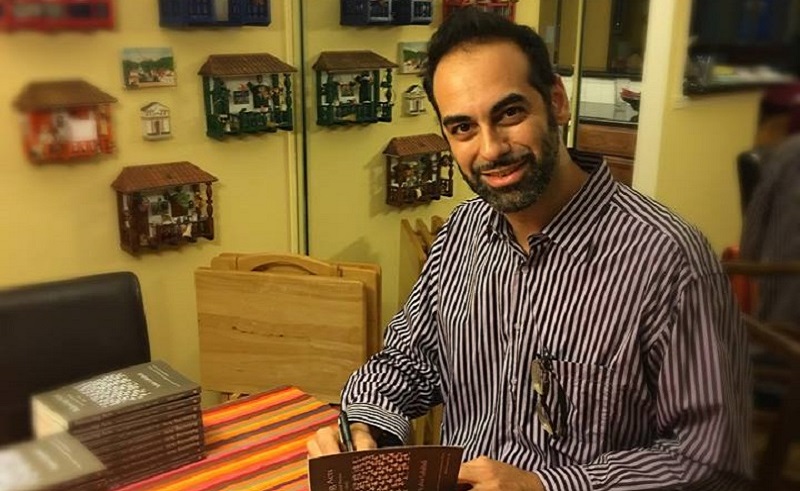Meet the Egyptian-American Writer Whose Work Was Praised by Barack Obama’s Inaugural Poet
Yahia Lababidi's soon-to-be published aphorisms may prove to be the most relevant literature of our generation.

Events move as fast as the flow of information, and in the age of the internet and social media, information has never before moved so fast. Add to this an increasingly volatile world, polarised and divided by terrorism, war, and extremism, and we have ourselves one of the most unforgiving periods known to mankind.
Since 9/11, much of the world has been thrown into turmoil. Wars waged, economies collapsed, dictatorships returned, and our political differences have been made irreconcilable. Events in the real world never fail to unleash the wrath of millions across the internet. Online arguments, where the art of debate has now become totally extinct, expose the worst of humanity. The hatred and intolerance that consumes comments sections throughout the cyber world, in turn, fuel the flames of conflict in our everyday lives. Reconciliation seems a far and distant prospect for humanity, if not a total impossibility.
“The one who hates themselves, sees that hated self in everyone they meet"
In times like these, we can't afford to be consumed by our hopelessness and our melancholy in this reality. For those of us who have the strength to reject it, it is our responsibility to actively challenge it. No tide can ever be changed whilst wallowing in a passive role. One Egyptian-American poet chose to be on the brighter side of this dilemma. Yahia Lababidi's latest offering, a collection of sayings and meditations conceived over a period of ten years, may prove promising in the struggle against this status quo. In response to this current age of nihilism, Lababidi is hoping to shine a light through these times with his graceful skills of the written word.
“To prolong pain is to miss the next lesson”
“Aphorisms are an ancient form, but its current-day master is Yahia Lababidi,” claimed Barack Obama’s inaugural poet, Richard Blanco, who has been among the many to heap praise on the young writer. PBS and Huffington Post are also among the big publications that have come to recognise Lababidi’s raw talent.
Lababidi started writing aphorisms more than 20 years ago as a teenager. His Egyptian upbringing exposed him to our timeless and pervasive amsal shaabiyya (proverbs and sayings), which spurred his interest in a very social form of poetry and philosophy. It is well known that Arabs, and Egyptians especially, can be very clever with language. We’ve all heard those witty one-liners that offer a gold mine of wisdom confined within a few short words. We’ve heard them from our grandfathers, our mothers, from the taxi driver, the street vendor, and the friendly stranger. Passed down from generations long ago and ever-present in our genetic memory, they are an integral part of Egypt’s cultural inheritance. This is what first inspired Lababidi’s love for language, which began his journey as a man of letters.
"A good listener is one who helps us overhear ourselves"
His upcoming book, Where Epics Fail, will be the second time his aphorisms are featured in a major publication. Lababidi's short utterings have also come out before in various literary journals and anthologies. Each aphorism offers a little piece of wisdom to better ourselves with, in ways that make epic changes to our lives. Lababidi believes it is the duty of all poets to become peace-makers through their art. He draws this inspiration from the words of poet Pablo Neruda, “poetry is an act of peace. Peace goes into the making of poetry as flour goes into the making of bread.”
“In the deep end, every stroke counts”
The Egyptian poet emigrated to the US 11 years ago, where his struggle to settle in and be accepted as a Muslim immigrant was a huge inspiration for his newest piece. Since Trump’s ascension to the US presidency, Lababidi feels that his mission has never been more important. Drawing from his own experience, he says, “as an immigrant and a Muslim and a writer in Trump’s bewildering America, I sense this peace mission with renewed urgency. Also, as a citizen of our increasingly polarised world, I feel called upon to use my art, in some way, to try and alleviate the mounting fear and loathing, directed at those of different backgrounds.”
“Cynicism’s knowingness cheats itself out of true knowing"
Where Epics Fail may be just a collection of words, but language is the engine that drives our consciousness. Sometimes it just takes a belief in a phrase or a proverb to guide us to better times. It is being celebrated for being a particularly timely piece; in an age where tweets, internet memes, and Facebook statuses have become the dominant forms of expression. In a way, we have all become part-time philosophers and occasional poets when we make passing comments or snap observations through our social media accounts. In an era where grand narratives are failing us, aphorisms may yet prove to be the most relevant and profound literary form of our generation. Lababidi reveals that it was the old Persian proverb “epigrams succeed where epics fail” that inspired the title of his new book.
“Best not flirt with disaster, lest it decide to commit”
Where Epics Fail may offer just a humble respite from a world that has descended into fear and chaos, but Lababidi hopes that they will resonate permanently within our collective consciousness. “It is my passionate wish that, in the short meditations found in Epics, readers will encounter thoughts that might begin to liberate and heal their wounded selves, and in turn, our wounded world,” he muses. If his words manage to capture enough of our imaginations and aspirations, we may just be able to heal these wounds and lift ourselves out of our current melancholy.
“Take two opposites, connect the dots, and you have a straight line”
'Where Epics Fail' is currently a work in progress and will be published by UK-based crowdfunding platform Unbound, in parternship with Penguin Random House. By visiting this link, you can help support Yahia Lababidi in finishing his book by making a pledge, or you can pre-order and receive a discount using this code: yahia17
Photo: Chris Rice Cooper Blog
- Previous Article This Archaeologist is Now Using Robots to Conduct Excavations in Egypt
- Next Article #GetScene: 7 Awesome Instagram Photos This Week
























